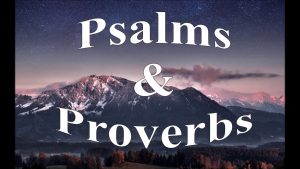
Shownotes
Wisdom-Trek / Creating a Legacy
Welcome to Day 1351 of our Wisdom-Trek, and thank you for joining me.
I am Guthrie Chamberlain, Your Guide to Wisdom
Mastering the Bible – Psalms and Proverbs – Worldview Wednesday
Wisdom - the final frontier to true knowledge. Welcome to Wisdom-Trek! Where our mission is to create a legacy of wisdom, to seek out discernment and insights, to boldly grow where few have chosen to grow before. Hello, my friend, I am Guthrie Chamberlain, your captain on our journey to increase Wisdom and Create a Living Legacy. Thank you for joining us today as we explore wisdom on our 2nd millennium of podcasts. Today is Day 1351 of our Trek, and it is Worldview Wednesday. Creating a Biblical Worldview is essential to have a proper perspective on today’s current events. To establish a Biblical Worldview, you must have a proper understanding of God and His Word. Our focus for the next several months on Worldview Wednesday is Mastering the Bible, through a series of brief insights. These insights are extracted from a book of the same title from one of today’s most prominent Hebrew Scholars, Dr. Micheal S. Heiser. This book is a collection of insights designed to help you understand the Bible better. When we let the Bible be what it is, we can understand it as the original readers did, and as its writers intended. Each week we will explore two insights.
Mastering The Bible – Psalms and Proverbs
Insight Forty-Nine: Proverbs Are Neither Prophecies nor Promises
Bible interpretation can be a lot like rendering a verdict in a court case. A jury has to have the data, the factual material relevant to the case at hand. It then needs to frame the data in the most coherent way. The goal is to declare guilt or innocence “beyond a reasonable doubt,” which is to be convinced that any other interpretation of the evidence is unreasonable.
Jury decisions can go terribly wrong, however, when some crucial point of data is omitted or overlooked in its deliberation. The same thing is accurate for understanding the Bible. A good illustration is the nature of biblical proverbs.
Proverbs are pithy sayings, or statements that are, by and large, accurate in everyday life. The proverb is a well-known literary genre in all cultures because people in all human cultures want to live wisely and to get the most out of life. No one expects a proverb always to be true. That isn’t its nature. Likewise, biblical proverbs are not true in all cases. They are, like all other proverbs, mostly true. They are truisms.
Because a proverb is a condensed piece of wisdom, it cannot address all the contingencies that could occur with respect to the circumstance it addresses. By design, that isn’t its purpose. For example, consider Proverbs 1:33: “But all who listen to me will live in peace, untroubled by fear of harm.” It simply isn’t the case that all godly people live in peace and never have fears. Even when the righteous trust God with the outcome of an awful expectation or event (e.g., physical violence), they cannot cease being human by suppressing a fear reflex.
Put another way; proverbs do not promise guaranteed outcomes. Proverbs are not designed to tell the future. They are designed to describe the present. This is important for correctly understanding a proverb such as Proverbs 22:6: “Direct your children onto the right path, and when they are older, they will not leave it.” This is a classic example of a truism. More often than not, a godly, nurturing upbringing will produce a child who wants to know God and follow him. But we all know exceptions. It isn’t a proper response to say that parenting must have gone wrong in some instances since no parent is perfect. Given that reality, there should be no godly children. The retort isn’t coherent. Neither is treating a proverb like a prophecy.
This is important for correctly understanding a proverb such as Proverbs 22:6: “Direct your children onto the right path, and when they are older, they will not leave it.” This is a classic example of a truism. More often than not, a godly, nurturing upbringing will produce a child who wants to know God and follow him. But we all know exceptions. It isn’t a proper response to say that parenting must have gone wrong in some instances since no parent is perfect. Given that reality, there should be no godly children. The retort isn’t coherent. Neither is treating a proverb like a prophecy.
Insight Fifty: The Books of Psalms and Proverbs Were Edited and Assembled in Stages
 I noted earlier that there is evidence of editing in biblical books, and how that should be no surprise. Biblical books classified as wisdom literature lend themselves to that sort of thing more naturally than others.
I noted earlier that there is evidence of editing in biblical books, and how that should be no surprise. Biblical books classified as wisdom literature lend themselves to that sort of thing more naturally than others.
For example, Psalm 72:20 tells readers matter-of-factly, “This ends the prayers of David, son of Jesse.” The only problem with that statement is that it isn’t true. There are many psalms of David that follow Psalm 72. The superscriptions of several psalms make this quite clear (e.g., Psalm 86: 101; 103: 108; 109; 110; 139; 140).
The statement in Psalm 72 is a classic marker of editorial activity. What we call the book of Psalms is actually five books. Many study Bibles will mark off the books with Roman numerals. “Book III” of the Psalms begins with Psalm 73. That makes it obvious that the comment in Psalm 72:20, the last verse of that psalm, was at one time the end of the psalms, which is what the verse says. As more psalms were collected and added to form Books III, IV, and V, the statement in Psalm 72:20 was rendered invalid yet allowed to remain in the text out of respect for the sacred nature of the material. The endings of Books I, III, and IV all end with a doxology. Something to the effect of “blessed be the LORD, Amen, and Amen.”
Proverbs also bears the marks of incremental collecting and editing. While we tend to think of Solomon as the author of the book, he is actually one of several figures credited with proverbs by the superscriptions within the book. Solomon is specifically credited with Proverbs 1-22, but the book contains material written by Agur son of Jakeh (Proverbs 30:1-14) and Lemuel (Proverbs 31:1-9). Much of the book is not attributed to anyone specific but labeled simply “words of the wise” (Prov. 22-24). Proverbs 25-29 are also apparently from Solomon Proverbs 25:1 These are more proverbs of Solomon, collected by the advisers of King Hezekiah of Judah. King Hezekiah lived many years after Solomon.
These sorts of indicators have two points of importance. First, they ought to make us more alert to the original context of a psalm or proverb. Sometimes a clear association with someone like David or Solomon is possible, allowing us to situate the content in a rough time frame. But in many instances, this isn’t obtainable, so we ought not relate that psalm or proverb to a specific person or situation for interpretation. Second, they are visible testimony to how inspiration really worked. Inspiration occurred over time and through the use of human hands. Knowing that helps us avoid bizarre ideas about how we got the Bible and helps us answer “difficulties” we encounter in the text, like the statement of Psalm 72:20.
That will conclude this week’s lesson on another two insights from Dr. Heiser’s book “Mastering The Bible.” Next Worldview Wednesday, we will continue with two additional insights. I believe you will find each Worldview Wednesday an interesting topic to consider as we build our Biblical Worldview.
Tomorrow we will continue with our 3-minute Humor nugget that will provide you with a bit of cheer, which will help you to lighten up and live a rich and satisfying life. So encourage your friends and family to join us and then come along with us tomorrow for another day of ‘Wisdom-Trek, Creating a Legacy.’ If you would like to listen to any of our past 1350 treks or read the Wisdom Journal, they are available at Wisdom-Trek.com. I encourage you to subscribe to Wisdom-Trek on your favorite podcast player so that each day’s trek will be downloaded automatically.
If you would like to listen to any of our past 1350 treks or read the Wisdom Journal, they are available at Wisdom-Trek.com. I encourage you to subscribe to Wisdom-Trek on your favorite podcast player so that each day’s trek will be downloaded automatically.
Thank you so much for allowing me to be your guide, mentor, and, most of all, your friend as I serve you in through this Wisdom-Trek podcast and journal.
As we take this Trek together, let us always:
- Live Abundantly (Fully)
- Love Unconditionally
- Listen Intentionally
- Learn Continuously
- Lend to others Generously
- Lead with Integrity
- Leave a Living Legacy Each Day
I am Guthrie Chamberlain….reminding you to ’Keep Moving Forward,’ ‘Enjoy your Journey,’ and ‘Create a Great Day…Everyday’! See you Tomorrow!